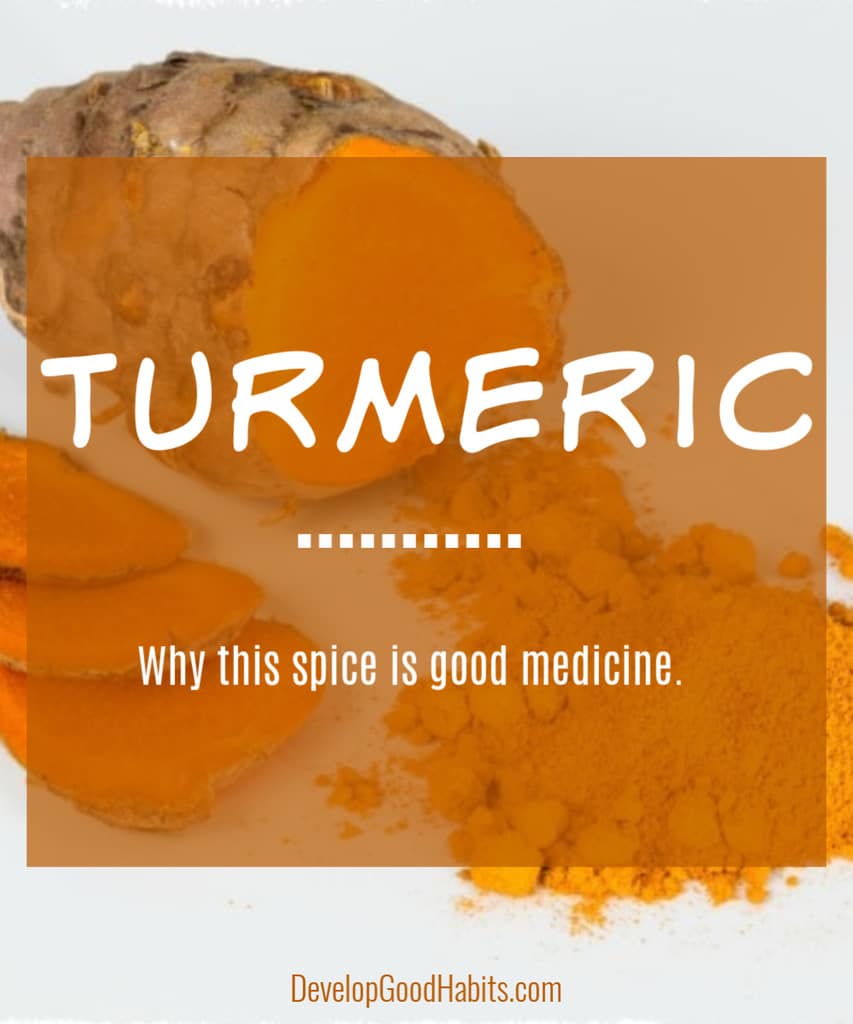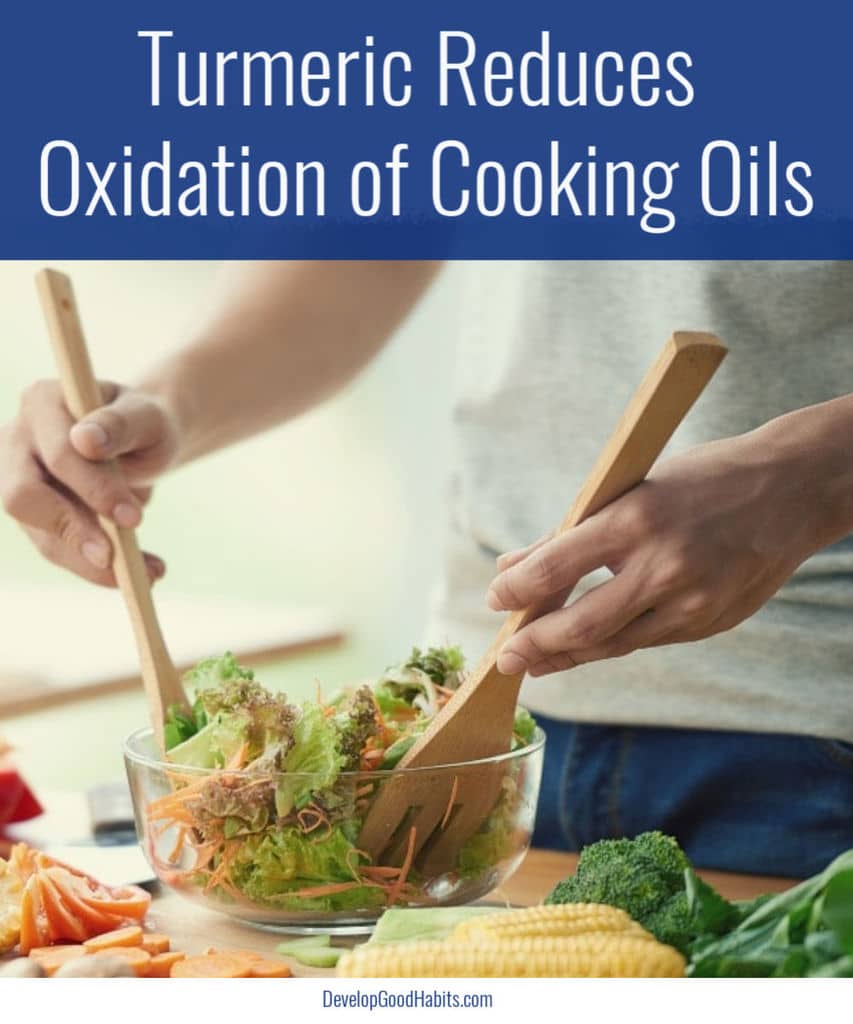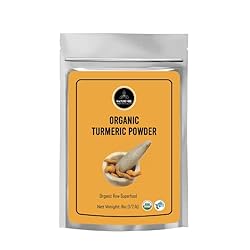There might be affiliate links on this page, which means we get a small commission of anything you buy. As an Amazon Associate we earn from qualifying purchases. Please do your own research before making any online purchase.
If someone were to ask you what you think the most powerful herb on the planet is for fighting and even reversing disease, would one of your first guesses be a component of tikka masala?
Many people don’t realize that the curry that is incorporated into this dish (and many others) has some very powerful compounds that are critical for proper health.
Turmeric has been argued to be one of the most beneficial herbs to our health. Its benefits are not only vast, but they are also very well researched, with over 10,000 published journal articles that prove it’s beneficial. The most healing compound in turmeric is curcumin.

If you want a great dietary supplement that you can easily incorporate into your daily health routine, look into the several ways you can use turmeric.
These studies have pushed turmeric to the top of the list when it comes to the most frequently mentioned scientific medicinal herbs — ahead of cinnamon, garlic, ginger, milk thistle, and ginseng. (And if you want a way to add turmeric to your diet, then be sure to check out this delicious golden tea.)
If you want a great dietary supplement that you can easily incorporate into your daily health routine, look into the several ways you can use turmeric. It is included in many recipes, and is now available in drinks that are offered in health food stores.
Here, we’ll define turmeric benefits. Discuss how it’s used. Cover 50 benefits of turmeric, and then profile seven products that you can use in your daily life that include this wonderful healthy plant.
Let’s get to it.
What Is Turmeric?
The root of the turmeric plant is in the same botanical family as ginger, and is native to Asia. It is the ingredient in curry that creates a deep, yellow color. For thousands of years, this spice has been used for both culinary and medicinal purposes.
In fact, there are records of turmeric being used as early as 250 B.C. for medicinal purposes such as relief from food poisoning and providing liver support. The curcumin in turmeric makes up about 3% of its total weight, and is the main compound that makes turmeric so effective in properly handling health concerns.
Uses for Turmeric
1. Supplement
People often use turmeric for targeted treatment by taking it as a supplement. To do this, it is best to take up to three grams (or 1 ½ teaspoons) daily. Turmeric has a bitter taste, so eating it plain may be unpalatable. Some great supplements to take to avoid the taste are Organifi's Daily Turmeric pills, turmeric curcumin, and turmeric bioperine.
Unlike when turmeric is used for culinary purposes when it is taken as a supplement, the fat-soluble active components are able to pass the blood-brain barrier and offer relief from arthritis, dyspepsia, menstrual pain, bronchitis, skin conditions, certain types of cancer, and neurological support.
Turmeric can also be used as a supplement in the form of an extract, which provides a potent and concentrated serving for targeted support.
2. Spice
The bright yellow color of turmeric spice is easily recognizable. When it is ground as a whole root, it looks more like ginger, with a slight orange tint. Using turmeric as a spice is an easy way to add flavor to your food while also getting the health benefits from this spice.
While it does have a bitter flavor, it pairs well with certain foods, and is often used to make curry powder, which is popular in Indian food. This organic turmeric and this natural organic turmeric are popular options when using turmeric for cooking.
3. Whole Root
When using the whole turmeric root, you can either cut it up and eat it by itself, or incorporate it into your salads or freshly made meals. When eaten as a root, turmeric tastes slightly bitter and peppery. It is best to eat between 1.5 and 3 grams each day.
What to Look for When Buying Turmeric
You will want to first decide how you want to consume your turmeric—whether in powder form, through supplements, whole root, teas, or extracts. For best results, follow these dosing instructions:
- Extract (95% curcuminoids): 1000 mg per serving
- Powder (curcumin): 400-600 mg three times per day
- Root: 1.5-3.0 grams per day
- Powdered root: 1-3 grams per day
Why You Should Consider Turmeric
When it comes to healthy herbs, turmeric is at the top of the list. It fights inflammation (which is an underlying cause of many diseases), and is a powerful antioxidant.
Many studies have shown its effectiveness in supporting normal bile production, healthy gallbladder function, a healthy pain response, and the production of immune-boosting proteins. It also helps the body maintain blood sugar levels, and promotes healthy cardiovascular and neurological function.
When it comes to healthy herbs, turmeric is at the top of the list. It fights inflammation and is a powerful antioxidant. And this is just the start of turmeric benefits.
Here is a comprehensive list of the benefits of turmeric.
![Turmeric uses and benefits [infographic]](https://www.developgoodhabits.com/wp-content/uploads/2019/10/Turmeric-uses-benefits-1-853x1024.jpg)
50 Proven Benefits of Turmeric
1. Cognitive Health
Turmeric has been found to restore memory and declined cognitive function. It can do this in four ways, including improving age-related memory decline, counteracting neurodegenerative diseases, reducing the impact of stress-induced cognitive decline, and protecting against toxicity-induced memory impairment.
2. Natural Anti-Inflammatory
One of the most popular benefits of turmeric is that the curcumin found in it is a potent anti-inflammatory agent. Curcumin stops the activity of the principal protein that regulates inflammation and the activity of other inflammatory chemicals. One reason people choose to use turmeric instead of anti-inflammatory drugs is that it does not lead to gastric side effects.
3. Prevents Blood Clots
Because turmeric reduces inflammation, it also acts as an anticoagulant and antiplatelet treatment. Studies have shown that turmeric inhibits the development of blood clots because of its blood-thinning abilities.
4. Reduces Depression
Research has shown that turmeric is comparable to Prozac in treating depression, and it can be used along with Prozac to boost the effects of this drug. As an anti-inflammatory, antioxidant, and neuroprotectant, turmeric aids in depressive disorders.
Research has shown that turmeric is comparable to Prozac in treating depression.
5. Boosts Skin Health
Turmeric can help improve skin health in several ways, including decreasing inflammation and oxidation. Turmeric can also speed up the body's healing process by restoring tissue in cutaneous wounds. Studies have also found that turmeric increases collagen, which boosts the skin's elasticity.
6. Prevents Certain Cancers
Diferuloyl methane, the principal active ingredient in turmeric, has been shown to have anticancer effects on malignant cells. Cancer cells are unable to rapidly spread or survive without a healthy blood supply, and turmeric prevents the development of new blood vessels within the body.
7. Arthritis
The analgesic properties of turmeric protect against arthritis. It also helps protect bone cells and bone tissue, helping to keep the bones strong.
8. Manage Diabetes
Turmeric has been proven to help control blood sugar and improve levels of insulin sensitivity. It can prevent the liver from accumulating fat, and it suppresses the activities of macrophages, which are white blood cells that lead to inflammation. Turmeric also improves insulin function by helping insulin penetrate the body's cells.
9. Obesity
Turmeric has an anti-obesity property that prevents the growth of fatty tissue and improves overall metabolic health. Supplementation of turmeric also accelerates the speed of weight loss when diet and exercise are both being practiced.
10. Inflammatory Bowel Disease
Considering some of the spicy foods that turmeric is used in, it might seem odd that one of the benefits of turmeric is fighting IBD. But it is.
The antioxidant and anti-inflammatory properties in turmeric relieve inflammatory bowel disease, which is characterized by inflammation in the gastrointestinal tract. Turmeric also reduces abdominal pain associated with inflammatory bowel disease.
11. Regulate Cholesterol
Turmeric helps to remove cholesterol from the liver, which protects the human body from fatty liver disease. It also helps prevent high cholesterol by controlling the assimilation of cholesterol in the body.
Turmeric is thought to communicate with liver cells to create more LDL receptors, which then clear cholesterol from the body.
12. Pain
Because curcumin is an anti-inflammatory, it also acts as a painkiller. It inhibits inflammatory chemicals such as prostaglandins and interleukins to help reduce pain. Turmeric is often used after surgery or burns. In oil form, turmeric has analgesic properties that are comparable to aspirin.
13. Toxicity
One of the liver's principal tasks is to remove toxins from the body. But with a constantly changing lifestyle and the low quality of food people eat, the liver has a hard time doing this job.
Studies on rats have demonstrated that turmeric aids the liver in flushing out toxins efficiently, and protects the liver from some, particularly harmful toxins.

14. Lowers High Blood Pressure
Several factors can impact one's blood pressure. Age, family history, body weight, lack of exercise, smoking, and poor diet are some risk factors that may lead to high blood pressure.
Chronic high blood pressure can lead to cardiovascular disease, vascular disease, kidney disease, loss of vision, and other detrimental health conditions. Lifestyle changes (including adding turmeric to one's diet) can help control blood pressure.
Turmeric has anti-hypertensive properties that prevent blood vessels from constricting, making it an effective treatment for atherosclerosis. Turmeric can also help to mitigate diseases that lead to high blood pressure.
15. Liver Function
Turmeric has a unique way of assisting the enzymes that are responsible for flushing the liver of harmful chemicals. This result is an increased amount of protection against liver damage, and even better liver function due to the regeneration of any affected liver cells.
16. Protects the Heart
Heart disease is a very broad term for several conditions that directly or indirectly impact one's heart health. Heart diseases are the number 1 cause of death worldwide, so heart health is very important for longevity.
Turmeric can protect the heart by acting on the genes that impact cardiac repair and heart function following a heart attack. Researchers also suggest that consuming dietary turmeric is beneficial for people recovering from a heart attack because it facilitates full cardiac repair.

Turmeric helps protect the heart by acting on the genes that impact cardiac repair and heart function following a heart attack
17. Digestive System
The anti-inflammatory and antioxidant properties in turmeric protect the digestive tract from bacterial infections. It is also a well-known carminative, which means it helps relieve bloating, making it an effective digestive aid.
18. Protects DNA
Turmeric has a genoprotective property that shields cellular DNA from damage. Studies show that turmeric extract can increase one's protection from DNA damage by up to 80%.
Turmeric has a dual role in protecting DNA. When it comes to cancerous cells, turmeric can protect DNA by sensitizing cancerous cells to medical interventions, leading to cell death.
19. Speeds Up Recovery After Surgery
Turmeric's anti-microbial and immune-boosting properties prevent infections from occurring after surgery. It also helps heal wounds quickly and reduces post-operative fatigue and pain.
The herb has many pharmacological properties that contribute to its healing powers. Its biological properties also protect against post-operative complications.
20. Protects Pancreas
The pancreas produces digestive enzymes and insulin that control the body's levels of blood sugar. This organ can become inflamed, leading to pancreatitis. Research has shown that turmeric can prevent and treat pancreatitis with its anti-inflammatory properties.
21. Heals Bone Fractures
Turmeric has traditionally been used to treat bone fractures. When used as a topical paste, it controls the inflammatory process and helps reduce pain. It also helps protect bone tissue and encourages bone remodeling.
22. Treats Muscle Disorders
Research has shown that turmeric's anti-inflammatory properties can help treat various muscle disorders such as degenerative joint disease, osteoporosis, muscular-cartilaginous disorders, and sarcoma.
23. Spleen Health
Turmeric benefits spleen health by boosting the body's immune function and preventing heavy metal toxicity. According to Chinese medicine, the spleen plays a vital part in one's health and vitality by turning digested food into nutrients and absorbing those nutrients. Turmeric helps this process by stimulating blood flow.
24. Post-Traumatic Stress Disorder
The characteristic symptom of PTSD is re-experiencing a past trauma, despite the absence of danger. It typically comes in the form of a flashback triggered by reminders such as similar circumstances.
Studies have suggested that dietary turmeric can prevent the reactivation of fear memories in PTSD.
Studies have suggested that dietary turmeric can prevent the reactivation of fear memories in PTSD. Its ability to relieve stress and anxiety also helps treat symptoms of PTSD.
25. Recovery After Stroke
Turmeric's neuroprotective and anti-inflammatory properties help to prevent and treat strokes. Turmeric's antioxidant properties also reduce oxidative stress that contributes to ischemic brain injury following a stroke. To help recover after a stroke, it is necessary to include antioxidants in one's diet.
Turmeric can also be used as a drug to help prevent blood clotting in strokes that block arteries. Studies have found that turmeric protects brain cells from damage by regulating the four major pathways for blood and increasing the growth and survival rate of neurons.
26. Help Treat Glaucoma
Inflammation plays a large role in several eye conditions, including glaucoma. Turmeric can protect the optic nerve from damage due to oxidative stress, which is common in glaucoma. Studies have found that turmeric gives statistically significant protection from eye damage.
27. Get Rid of Plaque
Here is another turmeric benefit that you could probably never guessed at… Turmeric gets rid of plaque buildup.
Herbs such as turmeric have shown huge promise in reducing plaque that accumulates in arteries while reducing the occurrence of side effects of drugs.
Turmeric reduces blood cholesterol levels in the body, which prevents plaque build-up. Plaque can also accumulate because of the oxidation of bad cholesterol, but turmeric can prevent artery blockage by stopping this oxidation process.
Turmeric is also a vasodilator, meaning it helps to relax blood vessels. This reduces the possibility of blocking blood vessels, prevents the accumulation of blood platelets, and stops blood clots from forming.
28. Relieves Cold/Cough
One of the longest-standing health benefits of turmeric is that it can instantly relieve a cough and cold. Turmeric's antioxidant properties in particular help to treat coughs and colds when it is mixed with warm milk.
Turmeric's antioxidant properties in particular help to treat coughs and colds when it is mixed with warm milk.

Drinking a glass of warm milk with turmeric before going to sleep helps speed up the recovery process from coughs and colds. Turmeric oil can be used to relieve a cough and decrease the amount of sputum in the lungs. Inhaling the fumes of turmeric oil helps relieve nasal congestion.
29. Oral Ulcers
Because turmeric is a natural antiseptic and a cooling agent, it is great for healing oral ulcers. Create a paste with turmeric and honey, and apply it to an oral ulcer to help speed up the healing process.
30. Anti-Asthma Agent
When used as add-on therapy in bronchial asthma, turmeric clears the airways and helps improve breathing capacity. It dilates blood vessels, which encourages better airflow, relaxes muscles, thins the blood, restores breathing patterns, and relieves inflammation caused by asthma that leads to swelling in the lungs that obstructs proper breathing.
31. Protects Liver From Toxins
Studies in rats have shown that turmeric helps protect the liver from toxins. When liver function is compromised, certain toxins take longer to get out of the body.
But those who include turmeric in their diets can excrete harmful toxins at a near-normal rate, which suggests that turmeric can improve liver function by protecting it from toxins.
32. Aids in Liver Fibrosis
Liver fibrosis occurs when the liver is damaged and begins to scar. Liver fibrosis is often caused by chronic Hepatitis B and C, liver disease due to alcohol, and fatty liver disease. Turmeric can reverse the impacts of liver fibrosis by inducing cell death in the types of liver cells that lead to fibrosis.
33. Prevent Gallstones
Turmeric can improve bile flow in the gallbladder, and prevent gallstones from forming by increasing the activity of antioxidant enzymes of the liver. Bile helps to digest fats, and is made of salts, water, cholesterol, and pigments.
When your body does not make enough bile, you are likely to have indigestion or heartburn. This is why you may see people taking turmeric to increase bile production.
34. Weight Loss
Turmeric can help improve weight loss efforts in several ways. It aids in digestion and metabolizing foods, and can protect the body from other disorders that accompany obesity. Along with diet and exercise, turmeric can help speed up the weight loss process.
Along with diet and exercise, turmeric can help speed up the weight loss process.
35. Thyroid Health
Hyperthyroidism is a disease caused by excessive levels of thyroid hormones. This can lead to an imbalance between the pro-oxidant and antioxidant levels in the body.
Turmeric can regulate the levels of enzymes in the body, and relieve oxidative stress that is induced in the brain by hyperthyroidism. Hyperthyroidism disrupts liver function, but turmeric can alleviate damage and restore healthy liver function.
36. Reduces Risk of Heart Attack
Because turmeric can widen arteries and get rid of plaque build-up, it can reduce one's risk of a heart attack. It also helps to reduce the stress in the body that often leads to a heart attack by relaxing the heart and arteries.
37. Reduces Symptoms of Premenstrual Syndrome
With its anti-inflammatory and neurologic effects, turmeric can help treat symptoms of premenstrual syndrome. Studies have shown that, compared to a placebo group, those who included turmeric in their diet saw a significant reduction in physical, behavioral, and emotional premenstrual symptoms.
38. Menopause
As a phytoestrogen, turmeric is a plant source of estrogen. This benefits women who are going through menopause, and acts as a painkiller and antidepressant during menopause as well.

39. Treats UTIs
Researchers have found that turmeric can stop the growth of microbes that lead to urinary tract infections. Turmeric does this by increasing these microbes’ sensitivity to antibiotics, making antibiotics more effective.
40. Psoriasis Treatment
Turmeric has been found to be effective in treating psoriasis, which is caused by inflammation. The therapeutic effects of turmeric on psoriasis are similar to those of the prescription steroid clobetasol.
41. Treats Acne
Turmeric can be made into a paste to use on acne-prone skin. It kills the P. acnes bacteria that leads to acne inflammation. It also removes excessive sebum from the skin. Turmeric has anti-oxidant and anti-inflammatory properties that are both beneficial in treating acne.
Turmeric has antioxidant and anti-inflammatory properties that are both beneficial in treating acne.
42. Lupus
Turmeric slows the activity of auto antibodies in people who are suffering from lupus. Its anti-inflammatory properties are also very therapeutic for lupus patients.
43. HIV Benefits
Researchers have found that turmeric is a strong anti-microbial agent that combats infections. This is of great value to people suffering from HIV because when the immune system is suppressed, it makes you vulnerable to many infections.
Turmeric has specific anti-HIV properties, such as its ability to stop the activity of enzymes that lead to HIV infections, stop the production of the protein that produces viral genes, and stop the activity of enzymes that are involved in virus replication.
44. Kills Cancer Cells
Several laboratory studies on cancer cells have proven that turmeric has anticancer effects. It has been shown to kill cancer cells and prevent new cancer cells from growing. Turmeric is especially effective on breast cancer cells, bowel cancer cells, stomach cancer cells, and skin cancer cells.
45. Boosts Immunity
Immunity is your body's way of defending against diseases that are caused by bacteria and viruses. Research has shown that turmeric has the necessary anti-inflammatory properties to help boost immunity.
46. Reduces Oxidation of Cooking Oils
Oil is widely used in cooking, mostly for frying and greasing food. But heating up oils like olive oil and vegetable oil leads to oxidation, which is harmful to one's health. Thermal oxidation is a health concern because it increases risk of cancer and fibrosis.
In a recent study, potatoes were coated in turmeric before being fried in soybean oil, and it was found that the oil oxidation greatly decreased. The antioxidant properties of turmeric preserved the polyunsaturated fatty acid structures during the heating process, which made them less harmful.

47. Protects From Food Pathogens
Cooking with turmeric not only can protect your food, but it can also make it healthier. Its properties increase food's nutritional value and improve the body's ability to absorb important nutrients. It can also remove the effects of harmful elements, such as the oxidation of oil and lipid peroxidation in meat.
Cooking with turmeric increase food's nutritional value and improve the body's ability to absorb important nutrients.
48. Prevents Alzheimer's
There is no cure for Alzheimer's, but there are prevention strategies that help patients continue to function independently.
Turmeric's anti-inflammatory and antioxidant properties and the ability to reduce beta-amyloid plaque build-up can help prevent Alzheimer’s.
49. Turmeric Benefits in Epilepsy and Seizures
Studies have found that turmeric has dose-dependent anti-seizure benefits. Consuming turmeric can significantly increase the delay of myoclonic jerks in seizures, as well as tonic-clonic seizures.
Turmeric has also shown to improve the seizure score and decrease the number of myoclonic jerks. Oxidative stress and cognitive impairment can be reversed by pre-treatment with turmeric as well.
50. Prevents Cystic Fibrosis
In studies involving rats, turmeric has been shown to be effective in increasing the survival rate of those with the genetic defect that may lead to cystic fibrosis. This promising finding has led to more studies that are currently being conducted on how turmeric can prevent cystic fibrosis and end this devastating disease.
Curcumin, the active ingredient in turmeric, is what makes it such a powerful natural remedy for a plethora of health issues. It is beneficial to your health to include turmeric in your diet as much as you can.
With worldwide recognition for its multiple health benefits and its effective antioxidant and anti-inflammatory properties, turmeric is widely known to support immune health, relieve pain and aid in digestion.
Final Word on the Benefits of Turmeric
Hopefully, this article has convinced you of the many health benefits of turmeric. I hope you will consider making cooking with turmeric a part of your healthy lifestyle.
Or even better, make turmeric supplements a part of your daily routine in addition to cooking with this healthy herb more often. (Again, I recommend checking out this golden tea if you'd like a simple way to introduce turmeric into your diet.)
There are many turmeric benefits. So many, in fact, that some are sure to help just about everyone. In some cases, the impact may be minor. In some cases, the benefits of turmeric will be major. But it is always worthwhile to add this healthy herb to your diet.
If you have any questions or comments about turmeric, please share it in them in the comments below. Also is you enjoyed this turmeric benefits page, please share it on your favorite social media platform.





Adulteration is a major concern for turmeric. According to the American Botanical Council, turmeric powder and extracts have been subject to deliberate, economically-motivated adulteration. Many bright yellow turmeric powders may currently be adulterated with synthetic dyes, such as metanil yellow or lead chromate, decreasing the usefulness of color as a measure of quality. These synthetic colorants may also pose a safety risk. Thus, it’s important that we buy turmeric powder from companies with strict quality control procedures.
Turmeric is one power packed spice that we all ought to use.
If you grow fresh turmeric in your kitchen garden, then you can avoid the problem of adulteration.
Great article about turmeric milk.
I found it interesting how you mentioned how the herbal supplement turmeric can help protect against arthritis due to the analgesic properties. My mother is getting older and she has realized that arthritis is a real issue that she faces every day. She wants to know what she can do to help her condition besides taking the prescribed medication. I will be sure to keep this in mind so we can find a herbal supplement capsule manufacturing service that supplies turmeric supplements!